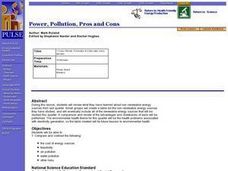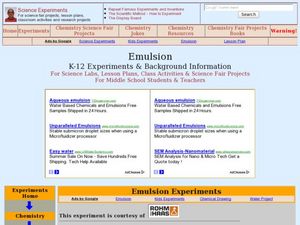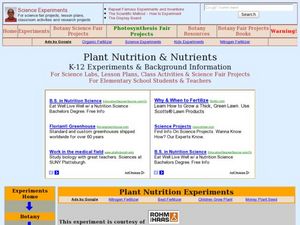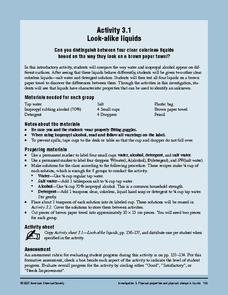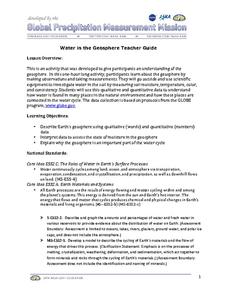Curated OER
Power, Pollution, Pros and Cons
Students review what they know about non-renewable energy, compare and contrast advantages and drawbacks of each type, such as cost of energy sources, feasibility, air pollution, water pollution, and other risks, and create table listing...
Curated OER
Identifying Text Structure #!
In this identifying graphic organizers and their texts worksheet, students observe chronological, compare & contrast, sequence, cause & effect, and problem & solution graphic organizers, read short passages, and match them....
Curated OER
Emulsions
Students identify the characteristics and composition of emulsions. In this chemistry lesson, students classify household products according to emulsion type. They explain how to make the best emulsion.
Curated OER
Living Sources of Weathering
In this sources of weathering worksheet, learners read about the various things that cause weathering including plants and animals. They answer four critical thinking questions about weathering.
Curated OER
Let's Take a Rock Apart!
Learners examine a crushed rock and sort the minerals they find in that rock by color and other properties.
Curated OER
The Blue Bottle: An Example of Teacher-Guided Inquiry
Learners observe a demonstration in which a bottle containing a colorless solution is mixed, turns blue, then becomes colorless again. They record observations, form and discuss hypotheses, and draw a conclusion based on the evidence.
Curated OER
Three Clouds Activity
Students understand how clouds are formed. In this cloud lesson, students participate in three experiments to make clouds. Students complete activity sheets for each experiment.
Curated OER
The Quicker the Better? Food Processing
Sixth graders evaluate the nutrition of various foods. In this healthy eating instructional activity, 6th graders discuss the processing of many common foods and what this means. Students identify and research unfamiliar ingredients in...
Curated OER
Bowen's Reaction Serives: Magma Differentiation
Students investigate the differentiation of magma to form different minerals present in a rock. By using the model proposed by Bowen, they determine the depth, temperature, and composition of magma. Students explain why some minerals...
Curated OER
Biology Trivia Questions
Students answer 71 questions about a variety of topics in biology. In this biology trivia lesson plan, students use the internet to find the answer to questions about the systems of the body, their structures and functions, the different...
Curated OER
Gettysburg Rocks Recycle to Win
Eighth graders use a geologic cross section to study the rock cycle of the Gettysburg battlefield. In this rock cycle lesson, 8th graders connect the rock cycle and continental rifting.
Curated OER
Marine Protected Areas (MPA)
Ninth graders explain the purpose of MPA's. In this biology lesson, 9th graders identify MPA's in Southern California. They simulate coastal sampling using candy from two buckets. Students analyze their results and share it with the class.
Curated OER
Classification of Matter
In this classification of matter worksheet, students answer 15 questions about solids, liquids and gases, types of mixtures and compounds vs. elements. They also answer 2 questions about measurement and 1 question about a biome.
Curated OER
Food Energy
Learners compare the energy value of traditional foods eaten by indigenous people with those of modern commercial foods. They use a calorimeter to measure and calculate the amount of stored energy in various food types, and identify the...
Curated OER
Introduction to the Periodic Table
In this periodic table worksheet, students will label the atomic number, atomic mass, element name, and element symbol for oxygen. Then students will determine the characteristics of the different groups of elements on the periodic table...
Curated OER
A Model of the Rock Cycle
In this rock cycle worksheet, students use different colored crayons to represent different types of rocks. They follow step by step procedures to model the rock cycle with the crayons. Students draw the rock cycle, show weathering,...
Curated OER
Plant Nutrition and Nutrients
Students observe seeds growth and examine the different parts of the seedling. In this biology lesson, students compare the growth of seeds planted in soil and in hydroponics. They record their observations in their science journal and...
Curated OER
Chemistry Module
High schoolers build metal atomic models using styrofoam. For this chemistry lesson, students identify the different unique properties of metals. They explain how metal atoms bond.
American Chemical Society
Using the Combining Test to Identify Unknown Liquids
Once investigators have learned how their mystery liquids interact with water during the preceding activity, they now use their observations to identify them. This is an ideal conclusion to the mini unit on the properties of water.
Curated OER
Evolution worksheet
Looking at evolution in detail, this thorough worksheet has complex questions requiring details and explanations of natural selection and diversity. Various examples of biological characteristics are available, and students choose the...
American Chemical Society
Look-Alike Liquids
Here is the first of four experiments to differentiate among unknown liquids by their behaviors and properties. Pupils observe how different liquids respond to being placed on plastic and paper, and they take notes about their...
Curated OER
Water in the Geosphere
Through a PowerPoint presentation and the embedded animation and video, earth science enthusiasts find out about the moisture in the soil beneath our feet. In the animation, follow a water molecule on its path through the water cycle. As...
Curated OER
Testing for Life’s Molecules
Want to hear a joke about sodium? Na. Young scientists test various materials to identify if they include protein, starch, and glucose by using the Biuret test, iodine starch test, and Benedict's test respectively. After practicing with...


